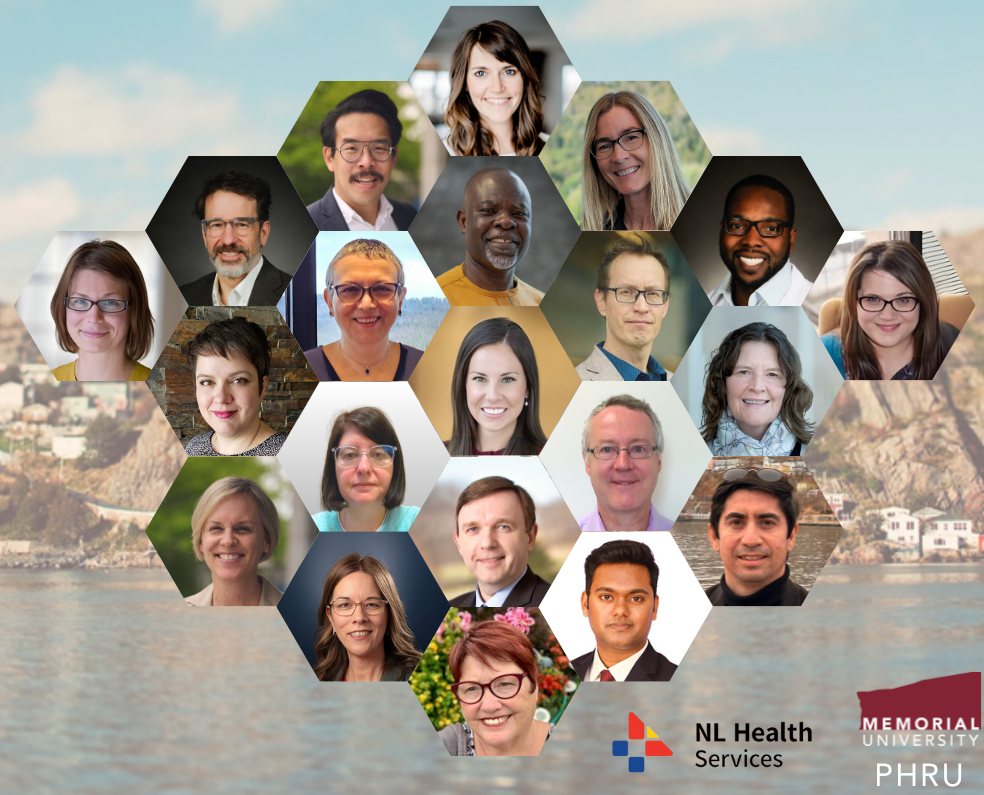Strengthening the Health Workforce for System Transformation: Meet the Teams and Hub
Hub
Health Workforce Research Evidence Support and Knowledge Mobilization (ESKM) Hub

Objective: The Health Workforce Research ESKM Hub will support the funded teams in bridging the evidence-policy-practice gap. The ESKM Hub will promote creative knowledge mobilization strategies, foster networking opportunities for team members, and coordinate rapid responses between research teams and knowledge users. The ESKM Hub is a partnership between Athabasca University and the Canadian Health Workforce Network (CHWN), leveraging CHWN’s existing pan-Canadian health workforce research infrastructure and resources. Using CHWN’s platform, alongside the digital-first research infrastructure supports at Athabasca University, the ESKM Hub will help create impact for all funded health workforce research teams to drive health system transformation.
ESKM Coordination Team: Kathleen (Kate) Leslie, Ivy Bourgeault, Patrick Chiu, Bukola Salami, Raha Mirshahi
Host institution: Athabasca University
Contact Information: kleslie@athabascau.ca
X: @drkateleslie; @athabascau; @CHHRN
Funders: CIHR Institute of Health Services and Policy Research (IHSPR)
Teams
| Research Profiles |
|---|

Strengthening the Health Workforce: Implementing an Intervention to Integrate Health Workers into Community CareResearch Summary: There is a threefold crisis in healthcare: not enough healthcare professionals, a growing and diverse population and inadequate community services to address their needs. Labour shortages have reached critical levels with disproportionate impacts on many sectors and regions. There is an increased demand for the provision of home healthcare services across the country. A McMaster University research team has partnered with one of Canada’s largest community care social enterprises to design, implement and evaluate an innovative health workforce solution. It focuses on internationally educated nurses to improve not only culturally-appropriate care but also their integration and retention in home care. Principal Investigator(s)/ Tripartite Leadership names: Andrea Baumann, Kaiyan Fu, Sharath Medlerimutt, Mary Crea-Arsenio and Valentina Antonipillai Institution: McMaster University Contact Information: baumanna@mcmaster.ca Funder: Social Sciences and Humanities Research Council (SSHRC) |

A New Provincial Training Hub: Building capacity for clinicians who care for children and youth with eating disordersResearch Summary: New eating disorders presentations surged during the COVID-19 pandemic, intensified by challenges with clinician availability and training in eating disorders. To address the workforce challenge, our team will study the roll-out of a Provincial Training Hub, which will build capacity in clinicians treating children and youth with eating disorders in BC and the Yukon. We will demonstrate the impact of training and consultation in evidence-based approaches for pediatric eating disorders, improve cultural responsiveness in training, and develop a strategy for national training. Our goal is to improve clinician well-being, and availability of quality evidence-based care for pediatric eating disorders. Principal Investigator(s)/ Tripartite Leadership names: Jennifer Coelho, Josie Geller, Kim Williams and Patricia Obee Institution: University of British Columbia Contact Information: Jennifer.coelho@cw.bc.ca Funders: CIHR Institute of Health Services and Policy Research (IHSPR), CIHR Institute of Human Development, Child and Youth Health (IHDCYH) and Michael Smith Health Research BC |

Enhancing Genetic Counselling Access and EfficiencyResearch Summary: With the advent of precision health, there has been a rapid increase in the utilization of genetic and genomic testing across all medical specialties and a consequent increased demand for genetic counselling services. This has resulted in unacceptably long (>year) wait times. Strengthening the healthcare workforce by integrating genetic counsellors where they do not currently practice and providing genetic counselling supports through innovative methods will contribute to cost efficiencies and improve access to genetic counselling services. We will take a multi-stream, multi-partner, and multi-site approach to deploy and deliver optimal clinical genetic healthcare to Canadians. Principal Investigator(s)/ Tripartite Leadership names: Alison Elliott, Larry Lynd, Nathan Michaels and Jennifer Nuk Institution: University of British Columbia Contact Information: aelliott@bcchr.ca Funders: CIHR Institute of Cancer Research (ICR), Canadian Partnership Against Cancer and Michael Smith Health Research BC |

Impact of a Fundamental Care Leadership Intervention on Workforce and Patient Outcomes and ExperiencesResearch Summary: Missed and ignored fundamental care was amplified during the COVID-19 pandemic eroding morale of nurses resulting in burnout, human health resource (HHR) shortages, and poor patient outcomes and experiences. We will address the erosion of fundamental, compassionate care and burnout in nursing and other healthcare professionals by implementing and evaluating the impact of an evidence informed, co-designed leadership intervention focused on embedding fundamental, compassionate care within healthcare organizations and ecosystems. This intervention will be available in English and French and is a key recovery strategy to strengthen the nursing and HHR workforce and improve fundamental care experiences and outcomes. Principal Investigator(s)/ Tripartite Leadership names: Lianne Jeffs, Jane Merkley, Sarabeth Silver and Sylvie Rey Institution: Sinai Health Contact Information: Lianne.jeffs@sinaihealth.ca X: @JeffsLianne Funder: CIHR Institute of Health Services and Policy Research (IHSPR) |

Optimizing the cancer care workforce utilizing existing health human resourcesResearch Summary: Collaborative Approach to Resource Optimization in the Cancer Care WorkFORCE (CAREFORCE) is a multidisciplinary, team-based Collaborative dedicated to addressing workforce-related challenges in cancer care. It is a 3-phase, 12 month program consisting of four key components: (1) structured education sessions; (2) a centre-specific workforce optimization project; (3) monthly coaching; and (4) a virtual Community of Practice. Our approach capitalizes on the inherent strengths of cancer centers in quality improvement, and is centred on fostering the capacity to diagnose, design, and implement context-specific workforce optimization strategies. This is a departure from the conventional, one-size-fits-all, top-down intervention paradigm prevalent in healthcare. Principal Investigator(s)/ Tripartite Leadership names: Monika Krzyzanowska, Abi Sriharan and Jonathan Irish Institution: Sunnybrook Health Sciences Centre Contact Information: Monika.krzyzanowska@sunnybrook.ca Funder: CIHR Institute of Cancer Research (ICR) and Canadian Partnership Against Cancer |
Clinic Mauve – Transforming integrated care and the health workforce for LGBTQIA+ migrant and racialized communitiesResearch Summary: LGBTQIA+ migrant and racialized people encounter intersectional structural barriers to care which are exacerbated by challenges in the areas of employment, housing, education, migrant status as well as family and/or community life. This project will support the Clinic Mauve’s Implementation Science Team (IST), which advances an intersectoral and integrated model of care to address the urgent health needs of LGBTQIA+ migrants and racialized people living in Montreal. This research team will further examine the possibilities and challenges of not only deploying innovative service delivery models, but also fostering an equitable health workforce, especially to support and retain systematically disadvantaged health workers. Principal Investigator(s)/ Tripartite Leadership names: Edward Ou Jin Lee, Ahmed Hamila, Javi Fuentes-Bernal, Andréanne Guidon, Zack Marshall, Régine Debrosse, Marianne Chbat and Osvaldo Arias Institution: University of Montreal Contact Information: edward.lee@umontreal.ca Funders: CIHR Centre for Research on Pandemic Preparedness and Health Emergencies and CIHR Institute of Population and Public Health |

Evaluating new licensure pathways for internationally educated nursesResearch Summary: Canadian nursing regulators have been under pressure to reform licensure processes and allow more qualified nurses into the healthcare system. In recent months, nursing regulators across Canada have rapidly implemented various strategies designed to streamline the licensure of internationally educated nurses (IENs) without sacrificing accuracy, safety, and quality. Through a pan-Canadian academic-practice-regulatory partnership, our team will evaluate the implementation of specific provincial regulatory reforms to support scaling equity-focused IEN licensure and integration pathways across the country. Our project will generate the needed evidence to work toward less siloed and more equitable nursing regulatory policy for IENs in Canada. Principal Investigator(s)/ Tripartite Leadership names: Kathleen (Kate) Leslie, Patrick Chiu, Bukola Salami, Joy Peacock and Adedoyin Olanlesi-Aliu Institution: Athabasca University Contact Information: kleslie@athbascau.ca Funders: CIHR Centre for Research on Pandemic Preparedness and Health Emergencies |

The Adaptive Mentoring Networks: Building a stronger Canadian Health WorkforceResearch Summary: Key issues in Canada’s Healthcare workforce crisis are a shortage of healthcare professionals (HCP), attrition and burnout, especially in primary care. The Adaptive Mentoring Networks (AMN) is an innovation that enables capacity building and improves HCP burnout and well-being. We have assembled a diverse team of experts to study 10 AMNs across Canda. The research aims to gain a scientific understanding of the drivers that increase the successful development of AMNs and build a framework to expand them in different healthcare settings. This research is vital for improving the well-being of HCPs and addressing the Healthcare workforce crisis in Canada. Principal Investigator(s)/ Tripartite Leadership names: Arun Radhakrishnan, Douglas Archibald, Joshua Rash, Jerry Maniate, Samuel Hickcox and Cristian Rangel Institution: Bruyere Research Institution Contact Information: aradhakrishnan@toh.ca X: @ArunRadk, @AdaptMentor, @RashJosh, @ManiateJ, @darchibald_doug Funder: CIHR Institute of Health Services and Policy Research (IHSPR) |

Lira Yun, Sherri Kashuba, Fadumo Robinson, Tracie Risling, Kiran Manhas, Christopher Burnie, Elisavet Papathanassoglou, Tyler Burley, Kara Penney, Lawerence So, Kathryn Halverson REACHing Excellence: A Transformative Mentoring Solution for Late-Career Nursing Workforce RetentionResearch Summary: In the first quarter of 2023, job vacancies for RNs and RPNs increased by 24% along with the average age of the nursing workforce. In Alberta, 26% of nurses are over 50 many nearing retirement and this is driving nursing shortage pressures expected to continue through 2030. The primary aim of this project is the advancement of the Retention through Experienced and Aspiring Career Harmony (REACH) program, a leadership track for late-career nurses. REACH aims to delay late-career nurses' retirement, combat system ageism, and enhance novice nurse retention through impactful mentorship matches, providing a multi-focused solution to nursing workforce challenges. Principal Investigator(s)/ Tripartite Leadership names: Tracie Risling, Fadumo Robinson and Devonee Mueller Institution: University of Calgary Contact Information: tracie.risling@ucalgary.ca Funder: CIHR Institute of Aging (IA) |

Embracing culturally responsive technology solutions to sustain the healthcare workforce in rural, remote, and Indigenous communities through hybrid careResearch Summary: Healthcare provider shortages in rural, remote, and Indigenous (RRI) communities are an important problem. In British Columbia, ‘hybrid care’ programs link health professionals through technology to treat patients (virtual care) alongside local providers (in-person care), bridging service gaps when providers are unavailable and supporting local providers. However, not all RRI communities have embraced such programs. We seek to understand the complexities of implementing ‘hybrid care’, how to make this approach culturally safe and adaptable to unique community needs, while improving healthcare workforce sustainability. Our learnings will be applied to developing service delivery guidelines and ‘hybrid care’ policy scalable across Canada. Principal Investigator(s)/ Tripartite Leadership names: Anurag Singh, Nelly Oelke, Kendall Ho, John Mah, Ray Markham and John Pawlovich Institution: University of Northern British Columbia Contact Information: Anurag.Singh@unbc.ca X: @RCC_bc; @UBCNMP_unbc Funders: CIHR Institute of Health Services and Policy Research (IHSPR) and Michael Smith Health Research BC |

A simulation-based coaching leadership intervention to address pediatric health workforce retention and wellbeing.Research Summary: The Canadian pediatric healthcare workforce is facing significant challenges. To strengthen and foster pediatric health workforce sustainability, our research seeks to understand the unique experiences of pediatric providers to inform adaptation of a managerial coaching intervention. Our overarching aim is to implement and evaluate CLIMB (Coaching Leaders to Improve Management and well-Being), an evidence-informed leadership intervention to address burnout, and foster a resilient, equitable, diverse, and inclusive pediatric health workforce. Insights generated will provide decision-makers with evidence to address the pediatric healthcare workforce crisis and strengthen the healthcare system’s capacity to improve the health and wellbeing of children and youth. Principal Investigator(s)/ Tripartite Leadership names: Catharine Walsh, Abiramy (Abi) Sriharan and Lennox Huang Institution: The Hospital for Sick Children and University of Toronto Contact Information: catharine.walsh@utoronto.ca X: @catharinemwalsh, @SriharanAbi, @lennoxhuang Funder: Social Sciences and Humanities Research Council (SSHRC) |

Building Psychological Safety in Long-Term Care: Strengthening Equity & Trauma-informed Organizational Capacity to Support Workforce Mental Health & Well-beingResearch Summary: There is an urgent need to bolster psychological safety of Long-Term Care (LTC) workplaces through implementing supports that are equity and trauma informed. Our research builds capacity to implement tools to support trauma-informed approaches that foster LTC workplace psychological safety. Our team of principal knowledge users, researchers, health workers and health system decision makers will: 1) Engage LTC partners to co-design Equity & Trauma-informed supports; 2) Build capacity through rapid implementation; 3) Produce evidence on the implementation, and evaluation of these equity focused solutions; & 4) Increase sector-wide capacity by fostering knowledge mobilization to advance psychological safety of LTC workers. Principal Investigator(s)/ Tripartite Leadership names: Rosanra Yoon, Winnie Sun, Jennifer Calver, Norma Tomlin, Ian DaSilva, Janet Chee, Ivy Bourgeault, Shanoja Naik, Sherry Espin, Attila Kovacs and Julia Roitenberg, Sue Bookey-Bassett Institution: Toronto Metropolitan University Contact Information: rosanra.yoon@torontomu.ca X: @rosanra Funder: CIHR Institute of Aging (IA) |
Evaluating delivery of priority public health interventions to people experiencing homelessness in Toronto by peer workersResearch Summary: Long standing resource constraints and workforce challenges, in addition to marginalization, transience, and distrust of the health care system, inhibit the delivery of preventive care to people experiencing homelessness. The proposed project seeks to address the health workforce crisis and the resulting barriers to care through peer-led health delivery. Peers with experience of homelessness will provide services, such as sexually transmitted and blood-borne infection (STBBI) testing and distribution of harm reduction supplies, directly in the community. Supporting peer workers can improve diversity and optimization in the health workforce, providing an equity-focused solution to health human resources shortages and systemic barriers. Principal Investigator(s)/ Tripartite Leadership names: Aaron M. Orkin and Fiona Kouyoumdjian Institution: University of Toronto Contact Information: aaron.orkin@utoronto.ca Funders: CIHR Centre for Research on Pandemic Preparedness and Health Emergencies and CIHR Institute of Population and Public Health |

Erin Ballah, Stephen Wan, Cheryl Etchegary, Kris Aubrey-Bassler, Paul Banahene Adjei, Boluwaji Ogunyemi, Amanda Hall, Shabnam Asghari, Adam Wylie, Andrea Pike, Andrea Patey, Julia Lukewich, Holly Etchegary, Heather Hanrahan, Brendan Barrett, Deborah Wearn, David Diamond, Maisam Najafizada, Darla King, Fazle Sharior, Dorothy Senior. Maximizing the Potential of Primary Care: Implementing and Evaluating Team-Based Primary Care in Newfoundland and Labrador.Research Summary: Newfoundland and Labrador is introducing team-based primary care (PC) to address workforce challenges, improve population health, decrease inequity and flatten the health cost curve, leading stakeholders to suggest that PC is expected to solve all current health system challenges. While these statements are made tongue-in-cheek, there is sound theoretical basis for the potential of primary care to achieve these goals, but this will only happen with careful planning. Our research team will systematically describe the mechanisms through which primary care achieves the desired outcomes, comprehensively assess barriers, and compile theory-informed approaches to overcoming those barriers. Our goal is to maximize the potential of PC in health systems everywhere. Principal Investigator(s)/ Tripartite Leadership names: Kris Aubrey-Bassler, Amanda Hall, Darla King and Margot Antle Institution: Memorial University Contact Information: kaubrey@mun.ca; Amanda.Hall@mun.ca X: @MUN_PHRU Funder: CIHR Institute of Health Services and Policy Research (IHSPR) |

Implementation of a novel Indigenous Hub-and-Spoke Model of Care in Primary Care Networks (PCNs) in AlbertaResearch Summary: In healthcare, Indigenous patients often have complex health issues due to social, cultural, and environmental factors. We plan to establish an 'Indigenous Support Hub' model within Alberta Primary Care Networks (PCNs) to address this. This hub will serve as a shared resource for PCN clinic physicians, nurses, and other clinical providers, offering support for the social, cultural, and systemic factors influencing Indigenous patients’ health. Indigenous support workers will engage in virtual case conferencing with the clinician to provide guidance and advice on the patient’s case, fostering collaborative learning. This initiative will be carried out through a multi-method implementation science study. Principal Investigator(s)/ Tripartite Leadership names: Stephanie Montesanti, Lynden (Lindsay) Crowshoe, Val Austen Wiebe and Esther Tailfeathers Institution: University of Alberta Contact Information: montesan@ualberta.ca Funder: CIHR Institute of Health Services and Policy Research (IHSPR) |
- Date modified: